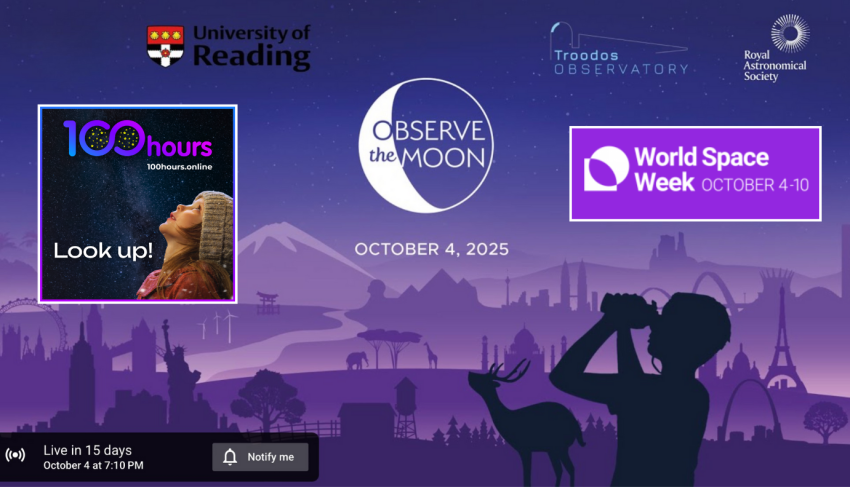This year's World Space Week is jam-packed with an array of fun activities – including a series of stargazing challenges for beginners and a live stream of the Moon's beautiful landscape.
The Royal Astronomical Society (RAS) is hosting the stream on its YouTube channel in collaboration with the University of Reading to mark International Observe the Moon Night 2025 on Saturday 4 October.
It will be relayed via Cyprus's new Troodos Observatory, while more than 300 members of the public are also set to enjoy spectacular views of the lunar surface through more than a dozen telescopes at the University of Reading's Whiteknights Campus.
The event will coincide with the beginning of World Space Week, an annual international celebration of science and technology which this year runs from 4-10 October.
The RAS is also supporting an initiative for stargazing beginners across the UK and Ireland called '100 Hours Under One Sky'.
Taking place from 2-5 October, the project is aimed at people who have a curiosity about what star patterns and planets might be circling above their head.
Those taking part can complete four simple challenges to win virtual badges and images to share on social media, and to put their marker on a map of the UK and Ireland. No binoculars, telescopes or any other specialist equipment is required, only a mobile phone to access the challenges via the 100hours.online/ website.
Astronomical societies across the country will also be running their own events and activities, some of which may incorporate '100 Hours Under One Sky', which is part of the global International Astronomical Union event 100 Hours of Astronomy.
Dr Jenny Shipway, who is heading up the initiative, said: "Stargazing is an inspiring and uplifting experience that everybody can enjoy.
"100 Hours Under One Sky is not aimed at those with expert knowledge of astronomy, it's about getting people interested in the stars and planets above their head – and to have fun doing it.
"All you need to do is visit our website, go outside, and look up!"
The website also includes information on how to spot a satellite, which look like stars but move slowly across the sky as you watch them. The best time to spot satellites is just after sunset or just before dawn.
To find out more about '100 Hours', follow the initiative on TikTok at @100Hours_stargazing or Instagram at @IAU_NOC_UK.
International Observe the Moon Night is an annual event led by NASA, inviting people worldwide to explore lunar science, celebrate their cultural and personal connections to the Moon, and, if weather permits, participate in outdoor observations.
The global event fosters a shared appreciation for the Moon and offers a unique opportunity to connect with others through astronomy and lunar exploration.
Dr James O'Donoghue, the University of Reading planetary scientist spearheading this year's event in partnership with the RAS, said: "Observe the Moon Night brings NASA and space science directly to people in their local communities.
"Our Moon is perfect for stargazing – it's close enough that you can see details with just your eyes, but telescopes reveal so much more. We're excited to show people how amazing the Moon really is and share the fascination humans have had with it for thousands of years."
The evening will begin with a series of engaging presentations from leading academics spanning multiple disciplines, all designed to captivate audiences from primary school level through to adults, before the main stargazing activities commence.
A live stream will be broadcast from 7-9pm BST on the RAS YouTube channel. To find out more about the event and a timeline of how it will unfold, click here.
Elsewhere, the Royal Observatory Greenwich will be hosting a 'Moon celebration weekend' on the 4-5 October. It will feature lots of inspiring events that explore humanity's deep and enduring connection to the Moon through observing, art, music, poetry and science, in partnership with the Old Royal Naval College.
There will also be a host of other World Space Week events across the UK and the world. To find out more, click here.
Professor Mike Lockwood, President of the Royal Astronomical Society, said: "World Space Week is a great opportunity to celebrate both the cosmos around us and the scientific endeavours involved in advancing our knowledge of the universe.
"Whether it's joining us for our live stream of the Moon, taking part in the '100 Hours' initiative, or going along to one of the many other events being held to mark World Space Week, I hope as many people as possible have a chance to savour the magic space has to offer."
ENDS
Media contacts
Sam Tonkin
Royal Astronomical Society
Mob: +44 (0)7802 877 700
Dr Robert Massey
Royal Astronomical Society
Mob: +44 (0)7802 877 699
Notes for editors
About the Royal Astronomical Society
The Royal Astronomical Society (RAS), founded in 1820, encourages and promotes the study of astronomy, solar-system science, geophysics and closely related branches of science.
The RAS organises scientific meetings, publishes international research and review journals, recognises outstanding achievements by the award of medals and prizes, maintains an extensive library, supports education through grants and outreach activities and represents UK astronomy nationally and internationally. Its more than 4,000 members (Fellows), a third based overseas, include scientific researchers in universities, observatories and laboratories as well as historians of astronomy and others.
The RAS accepts papers for its journals based on the principle of peer review, in which fellow experts on the editorial boards accept the paper as worth considering. The Society issues press releases based on a similar principle, but the organisations and scientists concerned have overall responsibility for their content.
Keep up with the RAS on Instagram, Bluesky, LinkedIn, Facebook and YouTube.


